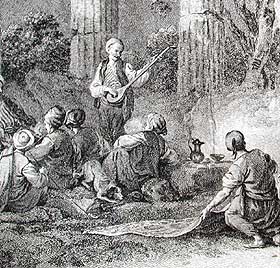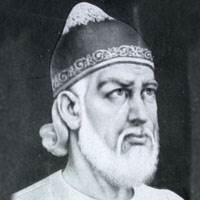|
Qit'a
The ''qit'a'' (from or 'piece') is a form of monorhyme poetry that usually appears in Arabic, Persian, Turkish, Urdu Urdu (; , , ) is an Indo-Aryan languages, Indo-Aryan language spoken chiefly in South Asia. It is the Languages of Pakistan, national language and ''lingua franca'' of Pakistan. In India, it is an Eighth Schedule to the Constitution of Indi ... and other associated literature. References Sources * Arabic literature Persian poetic forms Turkish poetry Urdu-language literature {{Poetry-stub ... [...More Info...] [...Related Items...] OR: [Wikipedia] [Google] [Baidu] |
Monorhyme
Monorhyme is a passage, stanza, or entire poem in which all lines have the same end rhyme. The term "monorhyme" describes the use of one (mono) type of repetitious sound (rhyme). This is common in Arabic, Persian, Latin and Welsh work, such as '' The Book of One Thousand and One Nights'', e.g., '' qasida'' and its derivative '' kafi''. Some styles of monorhyme use the end of a poem's line to utilize this poetic tool. The Persian ''ghazal'' poetry style places the monorhyme before the refrain in a line. This is seen in the poem "Even the Rain" by Agha Shahid Ali: :"''What will suffice for a true-love knot? Even the rain?'' :'' But he has bought grief's lottery, bought even the rain.''" The monorhyme ''knot'' is introduced before the line’s refrain or pause. The corresponding rhyme ''bought'' is used in the next line. Although these are not the last words of the lines in the poem, monorhyme is incorporated in identical rhyme schemes in each line. Examples An example of monorhym ... [...More Info...] [...Related Items...] OR: [Wikipedia] [Google] [Baidu] |
Arabic Literature
Arabic literature ( / ALA-LC: ''al-Adab al-‘Arabī'') is the writing, both as prose and poetry, produced by writers in the Arabic language. The Arabic word used for literature is ''Adab (Islam), Adab'', which comes from a meaning of etiquette, and which implies politeness, culture and enrichment. Arabic literature, primarily transmitted orally, began to be documented in written form in the 7th century, with only fragments of written Arabic appearing before then. The Qur'an would have the greatest lasting effect on Arab culture and its literature. Arabic literature flourished during the Islamic Golden Age, but has remained vibrant to the present day, with poets and prose-writers across the Arab world, as well as in the Arab diaspora, achieving increasing success. History Pre-Islamic poetry Pre-Islamic Arabic poetry is referred to in traditional Arabic literature as ''al-shiʿr al-Jāhilī'', "poetry from the Jahiliyyah". In pre-Islamic Arabia, markets such as Souk Okaz ... [...More Info...] [...Related Items...] OR: [Wikipedia] [Google] [Baidu] |
Persian Literature
Persian literature comprises oral compositions and written texts in the Persian language and is one of the world's oldest literatures. It spans over two-and-a-half millennia. Its sources have been within Greater Iran including present-day Iran, Iraq, Afghanistan, Pakistan, the Caucasus, and Turkey, regions of Central Asia (such as Tajikistan), South Asia and the Balkans where the Persian language has historically been either the native or official language. For example, Rumi, one of the best-loved Persian poets, born in Balkh (in modern-day Afghanistan) or Wakhsh (in modern-day Tajikistan), wrote in Persian and lived in Konya (in modern-day Turkey), at that time the capital of the Seljuks in Anatolia. The Ghaznavids conquered large territories in Central and South Asia and adopted Persian as their court language. There is thus Persian literature from Iran, Mesopotamia, Azerbaijan, the wider Caucasus, Turkey, Pakistan, Bangladesh, India, Tajikistan and other parts of Cent ... [...More Info...] [...Related Items...] OR: [Wikipedia] [Google] [Baidu] |
Turkish Literature
Turkish literature () comprises oral compositions and written texts in the Turkish language. The Ottoman form of Turkish, which forms the basis of much of the written corpus, was highly influenced by Persian and Arabic literature,Bertold Spuler''Persian Historiography & Geography''Pustaka Nasional Pte Ltd p 69 and used the Ottoman Turkish alphabet. The history of the broader Turkic literature spans a period of nearly 1,300 years. The oldest extant records of written Turkic are the Orhon inscriptions, found in the Orhon River valley in central Mongolia and dating to the 7th century. Subsequent to this period, between the 9th and 11th centuries, there arose among the nomadic Turkic peoples of Central Asia a tradition of oral epics, such as the '' Book of Dede Korkut'' of the Oghuz Turks— ancestors of the modern Turkish people—and the '' Epic of Manas'' of the Kyrgyz people. Beginning with the victory of the Seljuks at the Battle of Manzikert in the late 11th centu ... [...More Info...] [...Related Items...] OR: [Wikipedia] [Google] [Baidu] |
Urdu Literature
Urdu literature (, ) comprises the literary works, written in the Urdu language. While it tends to be dominated by poetry, especially the verse forms of the ''ghazal'' () and '' nazm'' (), it has expanded into other styles of writing, including the short story, or ''afsana'' (). Urdu literature is popular mostly in Pakistan, where Urdu is the national language, and in India, where it is an Eighth Schedule language. Origin Urdu developed during the 12th to 13th centuries, although the name "Urdu" did not exist at the time for the language. Amir Khusrau, who lived in the thirteenth century, wrote and gave shape to the Rekhta dialect (the Persianized combination of Hindavi), which was the early form of Modern Standard Urdu. He was thus called, the "father of Urdu literature". The continuing traditions of Islam and patronizations of foreign culture centuries earlier by Muslim rulers, usually of Turkic or Afghan descent, marked their influence on the Urdu language given that both ... [...More Info...] [...Related Items...] OR: [Wikipedia] [Google] [Baidu] |
Persian Poetic Forms
Persian may refer to: * People and things from Iran, historically called ''Persia'' in the English language ** Persians, the majority ethnic group in Iran, not to be conflated with the Iranic peoples ** Persian language, an Iranian language of the Indo-European family, native language of ethnic Persians *** Persian alphabet, a writing system based on the Arabic script * People and things from the historical Persian Empire Other uses * Persian (patience), a card game * Persian (roll), a pastry native to Thunder Bay, Ontario * Persian (wine) * Persian, Indonesia, on the island of Java * Persian cat, a long-haired breed of cat characterized by its round face and shortened muzzle * The Persian, a character from Gaston Leroux's ''The Phantom of the Opera'' * The Persians, an ancient Greek tragedy play written by the Athenian playwright Aeschylus in the 5th century BC * ''Persa'' (play) or ''The Persian'', comedy by the Roman playwright Plautus * Persian, a generation I Pokémon s ... [...More Info...] [...Related Items...] OR: [Wikipedia] [Google] [Baidu] |
Turkish Poetry
There were a number of poetic trends in the poetry of Turkey in the early years of the Republic of Turkey. Authors such as Ahmed Hâşim and Yahyâ Kemâl Beyatlı (1884–1958) continued to write important formal verse whose language was, to a great extent, a continuation of the late Ottoman tradition. By far the majority of the poetry of the time, however, was in the tradition of the folk-inspired "syllabist" movement (''Beş Hececiler''), which had emerged from the National Literature movement and which tended to express Patriotism, patriotic themes couched in the syllabic meter associated with Turkish folk poetry. The first radical step away from this trend was taken by Nazım Hikmet, Nâzım Hikmet Ran, who—during his time as a student in the Soviet Union from 1921 to 1924—was exposed to the modernist poetry of Vladimir Mayakovsky and others, which inspired him to start writing verse in a less formal style. At this time, he wrote the poem "''Açların Gözbebekleri''" ("P ... [...More Info...] [...Related Items...] OR: [Wikipedia] [Google] [Baidu] |



